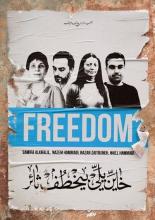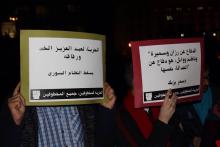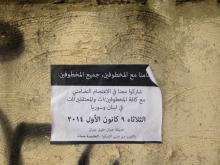You are here
Conflict Incident Report
Solidarity with the abducted activits: a demand from Beirut to free them all
A year ago, on December 9, four Syrian activists were kidnapped in the town of Douma, near the Syrian capital, allegedly by the armed opposition group Army of Islam. In commemoration of that event, a global campaign was launched to highlight the plight of these four. In Lebanon, the campaign was widened to include hundreds of thousands of political prisoners held across the region in the hands of governments and armed factions.
”[T]hey [the Douma4] represent the Syrian people empowered, aware of their strength when they act collectively, and above all they show that the people refuse any form of submission to authoritarianism.” – Joseph Daher, leftist academic On December 9, 2013, masked armed men burst into the offices of the Violations Documentation Center (VDC), an independent NGO that documents human rights violations in Syria by the Syrian regime and armed opposition groups. Four people were promptly whisked away to an unknown location. The four are: Razane Zaitouneh, her husband Wael Hamadeh, and their two colleagues, Samira Khalil, and Nazem Hammadi.
Zaitouneh, Hamadeh, Khalil, and Hammadi each have a long history in activism and struggle against the repressive Syrian state.
On her part, Zaitouneh is a well known Syrian human rights lawyer who was predominately concerned with defending the rights of political prisoners since 2001. She played a role in founding the Human Rights Association in Syria and the Syrian Human Rights Information Link, both of which caught the attention of authorities who banned her from traveling out of the country in early 2002. When the Syrian uprising began, she played a role in establishing the Local Coordination Committee (LCC) and the VDC, as well as other projects related to providing basic needs and essential services to areas that were besieged by violence.
Her husband, Hamadeh, is a human rights activist who opposed the regime years before the Syrian uprising began in 2011. Once the uprising started, Hamadeh was detained twice by the regime for his membership and work with the LCC and other organizations.
The third person, Khalil, wife of Syrian intellectual Yassin Hajj Saleh, had a long history struggling for political change in Syria that resulted in her imprisonment for four years under Hafez al-Assad's rule. She participated in the Damascus Declaration, a 5-page document created in 2005 that demanded peaceful reform, and was involved with a number of organizations related to human and political rights in Syria.
The final person, Hammadi, is a Syrian lawyer and poet, who worked within the LCC and provided aid to Syrians internally displaced from the violence.
The kidnapping is suspected to have been conducted by members of the armed opposition group, Army of Islam, established by Zahran Alloush – son of a Saudi-based religious scholar – that operates chiefly in the neighborhoods of Douma and Eastern Ghouta. Many suspect that the abduction was carried out do to the VDC's criticisms and documentation of violations by the Army of Islam in the area.
As Joseph Daher, a Syrian-Swiss leftist academic and activist, noted for Open Democracy, “The main reason behind the abduction is that these activists represent a threat to some groups, just as they do to the Assad regime. They represent the Syrian people empowered, aware of their strength when they act collectively, and above all they show that the people refuse any form of submission to authoritarianism.”
The plight of the Douma4, as they have been dubbed, has been lingering to date. Despite the prominence of Zaitouneh among the international human rights arena, there has been no tangible attempts by neither nations, international organizations, political Syrian opposition groups, nor the Syrian regime to seek their release. For its part, human rights organizations drafted an open letter that was released on Tuesday to reassert the importance of the matter.
Ultimately, the Douma4, like many others, are left in the mercy of the unknown.
In an attempt to spotlight their continued abduction over the course of the year, a global campaign was launched by various Syrian activists and their supporters, under the slogan of “The Kidnapper of a Revolutionary is a Traitor.”
For Lebanon, around 30 activists gathered Tuesday evening in downtown Beirut, at the Gibran Khalil Gibran Garden facing the ESCWA headquarters.
The demonstration here was mainly organized by the Socialist Forum, and a statement was drafted and signed by seven other organizations like the feminist Sawt al-Inswah, Beirut Walls, Syria Untold, and the Female Syrian Journalist Network.
Unlike other protests world-wide – such as in Ireland, Greece, Holland, and in Syria – that concentrated solely on the Douma4, the protest in Beirut expanded the call to include the estimated 70,000 to 100,000 Syrians in the prisons of the Syrian regime, the 17,000 Lebanese missing since the end of the civil war, the ongoing issue of the abducted Lebanese soldiers and policemen, and the thousands upon thousands of political prisoners in Palestine, Bahrain, Egypt, and elsewhere.
Slogans, banners, and chants at the modest protest was critical of the Syrian armed opposition groups, but also Islamic State in Iraq and Syria (ISIS), the Syrian regime, the Lebanese state, sectarianism, racism, and oppression.
“We consider both the Syrian regime and the armed opposition groups counter-revolutionary,”said Farah Kobaissy, a member of the Socialist Forum who participated in Tuesday's protest.
“The kidnapped, like Razane, and Wael, and the rest, follow revolutionary principles within their work that others are trying to erase. This demonstration is to support the kidnapped and those abducted, whether they are Lebanese in the hands of ISIS or Syrians in the hands of the Syrian regime, because they are all part and parcel of the same struggle, a battle that all the people of the region are involved in for real freedoms and democracies and actual changes.”
”[O]ur mobilization doesn't stop with Syria, it also calls for the immediately release of political prisoners in Bahrain, Saudi, or in Sisi's prisons in Egypt. All these people are part of the same struggle.” – Farah Kobaissy, Socialist Forum member“Supporting the [Douma4], is to support the Syrian revolution and is supporting the revolutions in the region. Our mobilization doesn't stop with Syria, it also calls for the immediately release of political prisoners in Bahrain, Saudi, or in Sisi's prisons in Egypt. All these people are part of the same struggle,” she said.
“Most importantly, the protest today is trying to tie together the politics between the families of the [Syrians] abducted [by Army of Islam] to those in Lebanon were kidnapped by militias like ISIS and Jabhat al-Nusra. They are all connected together. Our enemy is the same enemy,” she added.
Indeed, the power and potency of solidarity across communities is often ignored in many similar campaigns, and a holistic discourse that ties together various forms of oppression is far from the absolutist discourses and narratives found prevalent the mainstream. One of the core aims of the protest is a desire to proliferate the concept of inter-sectional solidarity, especially in matters like Syria that continues to be utterly divisive.
The organizers and participants are aware of the immense obstacles and undertaking required to further their cause.
“Who are we directing this campaign to tonight?” Camil Dagher, lawyer and member of Socialist Forum, rhetorically asked during a brief speech. “Who are we demanding to stand against the kidnapping and to liberate all the kidnapped in Lebanon, Syria, Iraq, and the rest of the Arab region?”
“The issue demands that we self-reflect completely with what's happening, and with the mobilizations against the status quo today,” he added. “There will be no ability to free all those kidnapped today without combining with a larger mass movement, whether in Syria, or Lebanon, or in Iraq. This movement has to be built, and this is a demand of the revolutionary left. And if this does not happen, all our campaigns and mobilizations will be illegitimate and fail.”
While Tuesday’s protest was symbolic, organizers and participants were adamant that they will continue to build networks, pursue acts of solidarity, and circulate discourses that challenge narratives pushed forward by those in power. Their goal “to liberate everyone” will be dependent on the strength of these solidarity networks, their ability to connect with the public-at-large, and on how violent the state and elites’ responses will be.
http://english.al-akhbar.com/content/%E2%80%98douma4%E2%80%99-kidnapped-...
http://www.amnesty.org/en/library/asset/MDE24/051/2014/ar/24c666a0-9d06-...




